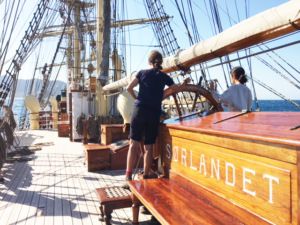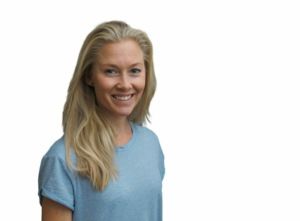Opinion
A Dane Abroad: Learning about life at the ‘aboard’ing school
Kirsten Louise Pedersen
This article is more than 7 years old.

Norwegians at sea, and for once they’re not looking for oil (photo: Kirsten Louise Pedersen)
Perched on the deck of the world’s oldest fully-rigged sailing ship still in operation, I watch a bunch of 16 to 20-years-olds crawling like monkeys up the ship’s towering masts and through the rigging, setting the sails as we wave goodbye to the island of Bequia in the Caribbean Sea.
Following a successful sail-powered exit manoeuvre, we head for Columbia. For a moment I forget that the youngsters currently hanging from the rig – looking tanned, free and a bit scruffy – are actually students completing the second year of their high school education.
Floating education
The 210-foot Sørlandet was built as an educational ship in Norway in 1927 by a passionate sailor as a gift to Norway. After surviving a world war, being sunk, and almost being sold off, Sørlandet was finally bought back by the grandson of the original founder and once again re-established as an educational ship.
In 2015, the non-profit Foundation Sørlandet established the A+ World Academy, and today, the grand old lady and a team of dedicated crew and faculty take up to 60 students a year through 12 months of high-level academic tuition.
Some 45 of the students are Norwegian, and the remaining 15 students, plus the teaching faculty, are international, providing an exciting mix of cultures on board. As I board the ship in Barbados, the students are already five months into their 10-month immersion journey during which they will visit a total of 17 countries spread over four continents.
To the untrained landlubber’s eye, the ship appears a maze of ropes and sails: more than 250 ropes and 27 sails to be exact. Every day the students have a set schedule of activities and responsibilities, such as being at the helm steering the ship, helping in the galley, being on night watch, doing the dishes, setting sails, non-stop maintenance, and the endless cleaning of the ship. All of this is on top of their daily school program.
Back to basics
Studying in this way is a rare opportunity. Captain Sune Blinkenberg knows of no other institution in the world that offers this experience at such a high academic level. He is passionate about delivering education in this way.
“In today’s school system, students go to school to read about other people’s experiences. Here, they go and get those experiences for themselves,” he told me, adding that this is how study and education used to be: learning by doing, and going out in the world to discover for oneself.
When I asked a Canadian student whether being part of this program has improved her academic achievements, she said no. But then she added that what it has given her in terms of life experience, confidence, perspective, adventure, interpersonal skills and maturity is priceless and second to none.
Perhaps it’s time to re-evaluate what we consider ‘good education’. From where I’m standing, it’s clear as a bright blue sky that more alternative educational initiatives like the one on Sørlandet would do our young generations (i.e all of us) a world of good. If you are curious about this program, check out aplusworldacademy.org.

About
Kirsten Louise Pedersen
Born and raised in Denmark and a resident of New Zealand for over 14 years, Kirsten has lived a nomadic life since her early 20s. A physiotherapist, yoga teacher and keen home cook, she is passionate about food, good living and natural health. Follow Kirsten on Instagram and at Facebook.










































